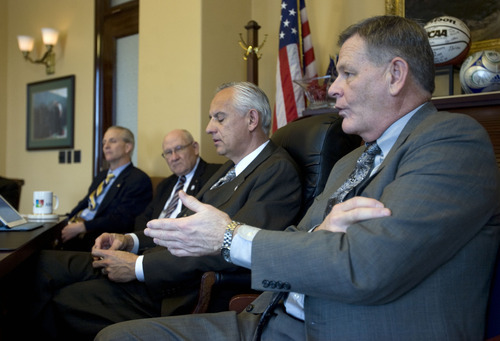This is an archived article that was published on sltrib.com in 2012, and information in the article may be outdated. It is provided only for personal research purposes and may not be reprinted.
A bill to give education funding to students — instead of schools — was kept in committee Wednesday morning to give lawmakers more time to work on it, possibly turning it into a smaller, test program rather than making a statewide change.
HB123, in its current form, would require the state to put most of the money it now sends to high schools into education savings accounts for students in grades 9-12. Bill sponsor Rep. John Dougall, R-American Fork, said that could equal about $6,400 per student per year.
Students could choose to spend that money to attend public schools, including charter schools; take public school online classes; and/or pay for courses offered by public and certain private, nonprofit Utah colleges. School districts and other providers would determine how much to charge for classes and that amount would be deducted from student accounts. Students could use any money left in their accounts after high school to continue their educations.
"Today, what we have is top down funding and we know many of the challenges that come with top down funding," Dougall said. "HB123 is what I call grassroots funding where we fund the student rather than institutions."
Dougall said the bill would put control in parents' hands, force schools to better serve students by creating competition, and make some students less apathetic because they would have a better sense of the cost of education and feel more ownership. Schools would still get funding for special education and a couple other areas, as some students cost more to educate than others, Dougall said.
Many, however, expressed concerns with the bill Wednesday. Rep. Carol Spackman Moss, D-Holladay, said though many parents are involved in their children's educations, some are not, and may not have enough knowledge of the school system to help kids make the best choices.
Rep. Steve Eliason, R-Sandy, said he liked the concept of the bill. But he wondered if schools would try to fit 50 or 60 kids in classes in order to make them cheaper, or if schools would cancel highly specialized classes if not enough students enrolled. And, he wondered what would happen if advanced students who wanted to take a lot of high level classes, which might be more expensive, ran out of money before they finished high school.
Dougall said there would be issues to work out if the proposal became law, but that ultimately it's best to leave decisions about how to spend the money up to families, because schools will respond to their needs.
Much of the debate Wednesday boiled down to a discussion of whether free market principles would work in public education, with lawmakers falling on both sides.
"It makes [schools] look a little more like a business, and businesses in America have done pretty good," said Rep. Kenneth Sumsion, R-American Fork, of the idea.
But Rep. Kay McIff, R-Richfield, noted that "in the free market system you see a lot of people bailing out or going bankrupt." He also noted the logistical difficulties of implementing such a program, especially for schools that have to plan ahead when it comes to buildings, teachers and other staff.
Rep. Merlynn Newbold, R-South Jordan, however, called it a "novel approach."
"It certainly is a fresh new look, and I think it meets some of the needs that we've talked about in public education as far as allowing flexibility to students to move at their own pace to create their own program," Newbold said.
Several in the audience also spoke in favor of the bill, including Wendy Hart, an Alpine School District board member who spoke as an individual Wednesday.
"I believe the primary responsibility of education rests with the parents and we need to continue to focus on that and reward and encourage that," Hart said. "The bottom line is our government and system should be designed to work from the bottom up, not the top down."
But Peggy Jo Kennett, with the Utah School Boards Association and a member of the Jordan School District board, urged lawmakers to study the matter further rather than pass it out of committee, warning against unintended consequences.
Ultimately, Sumsion moved that the committee hold the bill to allow time to amend it, suggesting perhaps it could be turned into a pilot or an opt-in program, in order to try it first on a smaller scale. Dougall said he was OK with that and hopes to bring it back to committee this session.
Ed funding conflict
Some criticize ed funding committee for blind-siding them with proposals that would cost school districts millions. › B9



